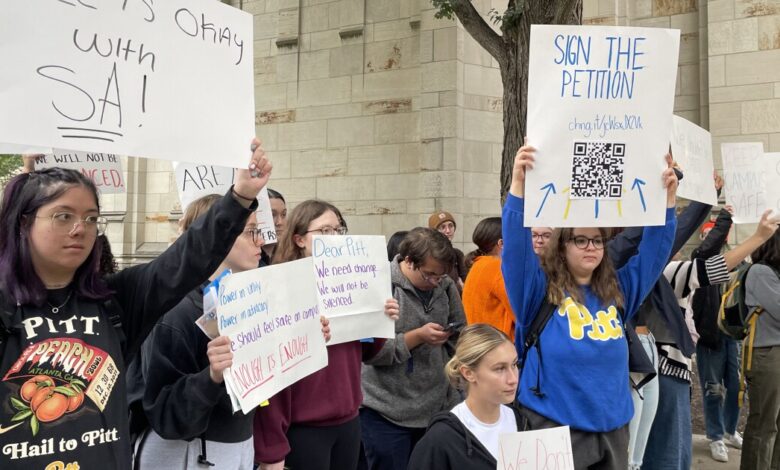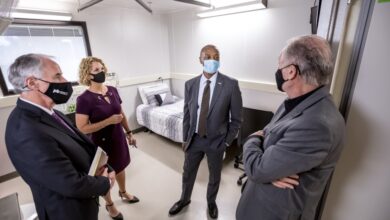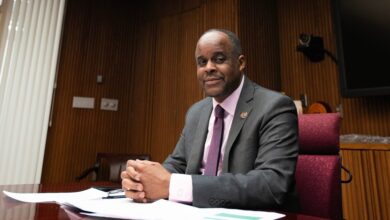A Petition on Sexual Assault Called for More Security. Then Came the Backlash.

[ad_1]
After a string of sexual assaults at the University of Pittsburgh, an online petition surfaced last week calling for increased security on campus. Within 24 hours, it accumulated 6,000 signatures and drew more than 100 students to a protest that disrupted a university homecoming performance. University officials responded with a series of new security measures.
Just as quickly, student backlash ensued, the petition was deleted, and a lengthy apology about the petition’s apparent support for more policing appeared anonymously on Reddit.
The controversy at the University of Pittsburgh illustrates the challenges of social-media-fueled campus activism, which can mobilize students within a few hours but often catches fire so fast that there’s little opportunity to adjust course. In the protest’s aftermath, students have noted that demands for action from the university — which involve students’ different visions of what a safer campus should look like — can’t be hastily thrown together.
Even though the petition missed the mark for some, students told The Chronicle that recent events have opened dialogue across the campus about sexual-assault prevention and safety — and inspired students to advocate for change going forward.
The petition was created last Thursday in response to an alleged sexual assault that occurred in the centerpiece building of the university’s main campus, the Cathedral of Learning. The petition writer hasn’t been named publicly; the Reddit user who posted the apology about the petition claimed to be the petition’s creator and an 18-year-old student at the university.
The petition proposed that the university restrict building access to students, increase its use of regularly monitored security cameras, and increase security “in general.” It also called for “expulsion for every attempt of rape.” The incident was the third sexual-assault crime alert that university police have sent since the start of the semester, according to Pitt News, the student newspaper.
‘Take It All Back’
The list of demands circulated widely among Pitt students on social media, spreading within hours from Yik Yak to Instagram. More than 100 students gathered the following day for a protest, where they demanded that the university take action and shared personal experiences of sexual assault. Later in the afternoon, some protesters held up signs behind the university’s marching band, which was performing in front of the Cathedral of Learning as part of Pitt’s homecoming celebration.
A few speakers at the protest discussed the petition’s shortcomings.
Following Friday’s protest, the university sent a campuswide email informing students that they were “taking additional action” to improve campus safety, including increasing patrols by security personnel and police officers at the building, known as Cathy.
The backlash came, in part, from those concerned that increasing police presence would threaten the safety of students of color. Some students shared these concerns at the protest, and others voiced their discontent through comments on a lengthy Reddit thread.
Clyde Wilson Pickett, the university’s vice chancellor for equity, diversity, and inclusion, told The Chronicle in a statement that his office is “in the process of doing outreach across the university” to better understand the concerns of students of color to “ensure that they are heard and know we are here for them.”
The key is to make sexual assault easier for victims to report and harder for perpetrators to get away with.
Other students criticized the petition for being hastily written and for not incorporating feedback from sexual-assault-prevention organizations on campus and in the community. The campus chapter of Take Back the Night helped publicize the protest and facilitate conversation last Friday, but Amanda Carson, a senior and group leader, said the chapter didn’t organize the event or draft the petition.
Sharon Bennett, a junior who helped lead protestors on Friday, agreed that the petition wasn’t perfect. The language it used and the demands it called for weren’t set in stone. Still, Bennett said it helped to move the conversation forward.
On the Saturday, the person who claimed to be the petition writer posted on Reddit that they wished they could “take it all back” and said they were considering taking a leave of absence, or transferring schools entirely.
“The fact that it seems like more campus cops are being added because of something that I did makes me a monster, and I know that,” the person wrote in the apology, which was posted the day after the protest. “I’ve never done anything like this in my entire life and it blew up quicker than I could have ever imagined.” The online response to the post was overwhelmingly sympathetic.
Amelia Aceves, a sophomore who uses gender-neutral pronouns, said they agree that the petition did a good thing: It got people talking about sexual assault. “I think that this person blamed themself a lot more than they needed to,” Aceves said of the petition creator.
Still, Aceves said they were disappointed when they initially read the demands, which didn’t seem feasible or well researched to them. Aceves felt that the petition was publicized by people who don’t have first-hand experience with sexual assault, or with the reporting process.
“I am glad everyone was angry, but I think the anger was really misdirected,” they said.
Aceves didn’t attend the protest due to a scheduling conflict, but they heard from friends who were there that it was comforting to share their pain with fellow survivors of sexual assault.
Frustrations About Title IX
Aceves said they were assaulted in their freshman dorm room last November, and the almost yearlong Title IX investigation that followed left them feeling frustrated.
The Title IX office was understaffed, they said, and the investigation process was drawn-out and murky as a result. The student they accused ended up getting off with a slap on the wrist, Aceves said. After learning that the student had the support of a lawyer, Aceves opted to forgo a formal hearing and pursued an informal resolution instead, which doesn’t include the possibility of suspension or expulsion.
Aceves said they weren’t informed that they were supposed to have an adviser during the process. They said the university also didn’t give them information about outside resources, like support centers. It’s commonly known at Pitt, Aceves said, that “if you get sexually assaulted, it’s not worth going to Title IX” because of how long and traumatic the investigation process can be.
In a comment sent to The Chronicle, a university spokesperson acknowledged that the university must provide trained advisers to assist if either party going through an investigation doesn’t have one, but said that “finding qualified advisers has been challenging.” The spokesperson also acknowledged staffing concerns within the Title IX office: “Reports into the office have increased significantly post-pandemic, and it is taking time to increase staff to meet these needs.”
The experience left Aceves with a lot of ideas for what needs to change in order for fellow survivors of sexual assault to feel supported. Specifically, they want to see more funding go into the Title IX office, as well as more resources — like support groups — readily available to survivors.
Ryan Walter, a junior who spoke at the protest, went through her own Title IX investigation, which lasted about ten months. While she described the process as long, drawn out, and “incredibly stressful,” she said it wasn’t necessarily a negative experience.
The student she accused is no longer on campus, which makes Walter feel better. But she still doesn’t feel safe knowing how often sexual assault happens. She hears multiple accounts “through the grapevine” every week.
That’s why Walter is among students advocating for increased security on campus. She and her peers want to see the swipe-in system — which was in place during Covid — reinstated. That would close off buildings to the public and make it easier to keep track of who goes in and out.
The group is also advocating for security cameras to be put in the stairwells, which is where last week’s assault occurred. Importantly, Walter said, these measures don’t require the increased presence of police on campus, which she thinks should be a last resort.
The university spokesperson told The Chronicle that the university’s Office of Public Safety and Emergency Management and its partners are “conducting a review of our security measures and policies, which include considerations such as card access, personnel deployment, and communication methods” and are “listening to our community’s concerns and ideas for what would make them feel safer as we implement additional measures.”
While Aceves agrees that increased surveillance measures could be beneficial, they said the emphasis on security misses the fact that most on-campus assaults happen in a dorm room between people who know each other.
Aceves is currently working with people they met through a support group to advocate for changes to Title IX. They want to use the momentum from the protest to keep the dialogue going and make meaningful change. Walter plans on attending an upcoming university-organized town hall and meeting with administrators to discuss her concerns.
The key, Aceves said, is to make sexual assault easier for victims to report and harder for perpetrators to get away with.
“If people know that we have a good Title IX office that follows up immediately and goes through with these hearings and does it in a fair way, rapists are not going to get away with as much.”
[ad_2]
Source link






